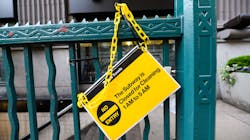NY: Future of NYC transit may rely on Senate runoffs in Georgia
Joe Biden’s victory in the presidential election could pump new life into New York’s mass transit systems — but the future of transportation in the city may hinge on a pair of runoff Senate elections in Georgia.
Metropolitan Transportation Authority officials say the agency needs $12 billion in pandemic relief from Congress by the end of 2021 or else they’ll be forced to lay off thousands of workers and slash subway service by 40%.
The agency also needs federal guidance and approval for its congestion pricing program, which will tax motorists who drive south of 61st St. in Manhattan and generate some $15 billion for key subway repairs.
MTA honchos have accused President Trump’s Department of Transportation of slow-walking approval for the program, which was intended to launch at the start of 2021 but has been delayed by at least a year.
President-elect Biden has pledged to push congestion pricing towards approval — but he and Congressional Democrats could be hampered in their efforts to deliver billions in aid to the MTA if Republicans retain control of the Senate.
Trump and Senate Republicans approved roughly $4 billion in COVID-19 relief in March through the CARES Act, but that money dried up in August and Congress has not passed another pandemic stimulus bill.
With Democrats retaining control of the House, all eyes turn to a pair of Georgia runoff elections on Jan. 5 that will determine control of the Senate — and potentially the MTA’s future.
“We’re hopeful a new administration will deliver on these critical priorities of national importance and act urgently to stave off these devastating cuts no one wants to have to make,” said MTA spokeswoman Abbey Collins.
But there’s a catch: The MTA may not have enough money to make it until Jan. 4, much less to Biden’s inauguration on Jan. 20.
“The MTA board has to pass a budget in December,” said Rachael Fauss, an analyst at the good government group Reinvent Albany. “We’ll see if it includes contingencies that allows them to revise it come February, after the inauguration, but they’re going to be essentially buying time until they get that resolved.”
The MTA is able to borrow $3 billion from the Federal Reserve’s Municipal Liquidity Facility, which transit honchos have likened to a last-ditch option to keep trains and buses running.
There’s also the possibility that Senate Republicans pass a “skinny stimulus” bill before the end of the year, said Nick Sifuentes, executive director of the Tri-State Transportation Campaign.
“Any stimulus in January would necessarily be much larger than it would if it were passed by the Republicans now,” said Sifuentes. “That puts the onus on Sen. Schumer to make sure transit funding is in anything that happens in the lame duck session.”
But if the MTA doesn’t get relief from Congress by the end of the year — and if the Republicans retain control of the Senate — then straphangers could be in for a world of hurt for years to come.
Without $12 billion in Congressional relief, the MTA would be permitted to use funds from congestion pricing to pay for daily operating costs instead of major construction work.
The MTA was in rough shape long before Trump took office — and the agency has a long history of deferring maintenance and using construction bonds to pay its daily bills.
That deferred maintenance was a major contributor to the city’s last major transit crisis in 2017, when the subway’s on-time performance fell to 58% and ridership dipped. Some experts worry the financial pain from the pandemic could cause another vicious cycle for the MTA.
“They are still finishing the 2015-2019 capital plan. There’s still a lot unfinished work," said Fauss. “If it’s a choice between massive service cuts and draining congestion pricing money to keep the system running, it’s sort of, what’s the best of two terrible choices?"
___
(c)2020 New York Daily News
Visit New York Daily News at www.nydailynews.com
Distributed by Tribune Content Agency, LLC.
